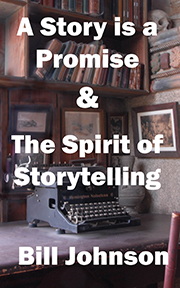
A seventh edition of my writing workbook, A Story is a Promise & The Spirit of Storytelling, is now available for $2.99 from Amazon Kindle. |
| About the Author |
Writing the Fantasy Hook
Notes on Page 3 of George R. R. Martin's
Game of Thrones
My goal here will be to break down the 13 pages of the prologue, one page at a time.
On Page 3...
His cloak was his crowning glory, sable, thick and black and soft as sin. "Bet he klled them all himself, he did," Gared told the barracks over wine, "twisted their little heads off, our mighty warrior." They had all shared a laugh.
These lines convey just how desperate this prince must be to prove himself, if he's a laughingstock to me like Gared. Gared out on a patrol in a dangerous place with a man with something to prove is not a good place to be.
It is hard to take orders from a man you laughed at in your cups, Will reflected as he sat shivering atop his garron. Gared must have felt the same.
"Mormont said we should track them, and we did," Gared said. "They're dead. They shant trouble us no more. There's hard riding before us. I don't like this weather. If it snows, we could be a fornight getting back, and snow's the best we can hope for. Ever seen an ice storm, my lord?"
Gared is playing a weak hand as best he's able.
The lordling seemed not to hear him. He studied the deepening twilight in that half-bored, half-distracted way he had. Will had ridden with the knight long enough to understand that it was best not to interrupt him when he looked like that. "Tell me again what you saw, Will. All the details. Leave nothing out."
There's a reason for the lording to ask for the details, and the details will soon play out in the action. Martin has given the reader a reason to want those details, to want to know more.
Will had been a hunter before he joined the Night's Watch. Well, a poacher in truth. Mallinsters' own woods, skinning one of the Mallinster's own bucks, and it had been a choice of putting on the black and losing a hand. No one could move through the woods as silent as Will, and it had not taken the black brothers long to discover his talent.
Again, the conveying more information in the context of the flow of the action. And that this is a brutal world.
"The camp is two miles farther on, over that ridge, hard beside a stream," Will said. "I got close as I dared. There's eight of them, men and women both. No children I could see. They put up a lean-to against the rock. The snow's pretty well covered it now, but I could still make it out. No fire burning, but the firepit was still plain as day. No one moving. I watched a long time. No living man ever lay that still."
The pressing question, if these people are dead, who killed them? Are they still around?
"Did you see any blood?"
"Well, no," Will admitted.
"Did you see any weapons?"
"Some swords, a few bows. One man had an axe. Having looking, double-bladed, a cruel piece of iron. It was on the ground beside him, right by his hand."
Now the question, if they are dead, why no blood, especially in this world? Some were clearly able to defend themselves.
So, the end of the third page ends with a question that would draw a reader forward to turn the page.
This process of creating story movement that in turn compells the reader to keep reading, is at the heart of good storytelling. Someone could master all the techniques of writing fiction, but a story that is not compelling is an unread story.
Top of page